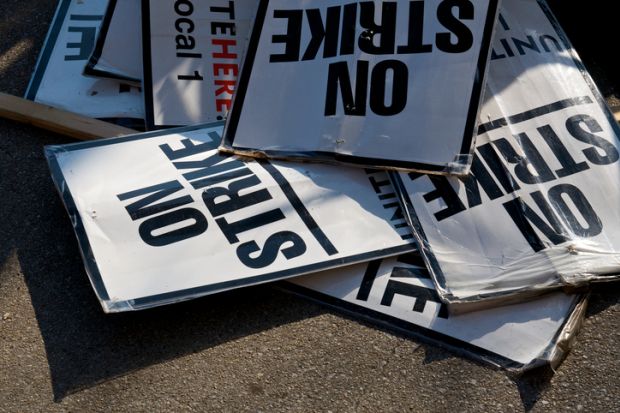Union members on dozens of UK campuses are set to go on strike over pay and pensions after overwhelmingly backing the walkout in a ballot.
Overall, 79 per cent of University and College Union members who voted backed a strike over proposed changes to contributions to UK higher education’s biggest pension fund, the Universities Superannuation Scheme. Seventy-four per cent of voting members supported walking out over the 1.8 per cent minimum pay offer for 2019-20 made by the Universities and Colleges Employers Association.
By law, unions must pass a 50 per cent turnout threshold to take strike action. The overall turnout in the USS ballot was 53 per cent while, on pay, it was 49 per cent. However, UCU chose to count the ballots by branch: 41 branches out of 69 passed the threshold on the USS ballot, and 54 out of 147 beat the threshold on pay.
Since the threshold does not apply in Northern Ireland, members at Queen’s University Belfast and Ulster University will also walk out. Results from four English campuses were still being counted.
About 1 million students would be affected by the strike action, according to UCU, which said that its higher education committee would meet on 1 November to consider its next steps.
Jo Grady, UCU’s general secretary, said that the ballots “reflect just how unhappy and angry staff are about the state of higher education in the UK”.
“Universities only have themselves to blame after failing to address falling real-terms pay and for refusing to deal with casualisation, workloads and the rising cost of USS pensions,” Dr Grady said.
“Universities now have to come back to us prepared to work seriously to address these problems. If they choose to ignore this message from their staff then strike action looks inevitable.”
The results pave the way for a repeat of scenes on campuses last year, when staff at 65 institutions walked out for 14 days over the proposed closure of the part of the USS scheme that guarantees members a set level of income in retirement.
While that threat has now been seen off, UCU argues that the cost of increased contributions should be paid by employers alone, rather than being shared with staff. Staff contributions of 9.6 per cent of salary have now been imposed, up from 8 per cent in April.
A Universities UK spokesman said that employers “remain open to further talks with UCU” but highlighted that institutions were paying the bulk of the increase in contributions.
“In a challenging economic environment, this outcome is the best that could be achieved. Crucially, it is acceptable to both the USS trustee and the Pensions Regulator,” UUK said.
On pay, there remains a significant gap between Ucea and the unions, which wanted an increase equivalent to inflation as measured by the retail price index – currently 2.4 per cent – plus 3 per cent, or £3,349, whichever was greater. Unions also want action to be taken to address concerns about casualisation and rising workloads.
Members of two other unions, Unite and the Educational Institute of Scotland, also voted in favour of strike action but failed to hit the 50 per cent threshold in their aggregate ballots.
Ucea said that strike action would be “an unrealistic attempt to force…employers to reopen the concluded 2019-20 national pay round and improve on an outcome that is for most of these institutions already at the very limit of what is affordable”.
Ucea said that what it described as the “low turnouts” in the ballots was “a clear indication that the great majority of university union members as well as wider HE employees understand the financial realities for their institution”.
UCU members previously voted in favour of strike action over the 2018-19 pay offer of 2 per cent, but the turnout was shy of the 50 per cent threshold required.
chris.havergal@timeshighereducation.com
The 41 universities that passed the 50 per cent turnout threshold in the USS ballot:
- University of Aberdeen
- Aston University
- Bangor University
- University of Bath
- University of Birmingham
- University of Bradford
- University of Bristol
- University of Cambridge
- Cardiff University
- City, University of London
- Courtauld Institute of Art
- University of Dundee
- Durham University
- University of East Anglia
- University of Edinburgh
- University of Exeter
- University of Essex
- University of Glasgow
- Goldsmiths, University of London
- Heriot-Watt University
- Lancaster University
- University of Leeds
- University of Leicester
- Loughborough University
- University of Manchester
- Newcastle University
- University of Nottingham
- The Open University
- Queen Mary University of London
- Royal Holloway, University of London
- University of Reading
- Scottish Association of Marine Science
- University of Sheffield
- University of Southampton
- University of St Andrews
- University of Stirling
- University of Strathclyde
- UCL
- University of Warwick
- University of York
- University of Wales
Also eligible to take strike action:
The 54 universities that passed the 50 per cent turnout threshold in the pay and conditions ballot:
- University of Aberdeen
- Aston University
- Bangor University
- University of Bath
- University of Birmingham
- Bishop Grosseteste University
- Bournemouth University
- University of Bradford
- University of Brighton
- University of Bristol
- University of Cambridge
- Cardiff University
- City, University of London
- Courtauld Institute of Art
- University of Dundee
- Durham University
- University of East Anglia
- Edge Hill University
- University of Edinburgh
- University of Essex
- University of Exeter
- University of Glasgow
- Glasgow Caledonian University
- Glasgow School of Art
- Goldsmiths, University of London
- Heriot-Watt University
- University of Kent
- Lancaster University
- University of Leeds
- University of Leicester
- Liverpool Hope University
- Liverpool Institute of Performing Arts
- Loughborough University
- University of Manchester
- Newcastle University
- University of Nottingham
- The Open University
- University of Oxford
- Queen Margaret University
- Queen Mary University of London
- University of Reading
- Robert Gordon University
- University of Roehampton
- Royal Holloway, University of London
- University of Sheffield
- Sheffield Hallam University
- University of Southampton
- University of St Andrews
- University of Stirling
- University of Strathclyde
- UCL
- University of Wales
- University of Warwick
- University of York
Also eligible to take strike action:
Ballots were still being counted at the following four institutions:
- Institute for Development Studies
- University of Liverpool
- Liverpool School of Tropical Medicine
- University of Sussex
Register to continue
Why register?
- Registration is free and only takes a moment
- Once registered, you can read 3 articles a month
- Sign up for our newsletter
Subscribe
Or subscribe for unlimited access to:
- Unlimited access to news, views, insights & reviews
- Digital editions
- Digital access to THE’s university and college rankings analysis
Already registered or a current subscriber?








